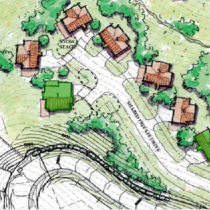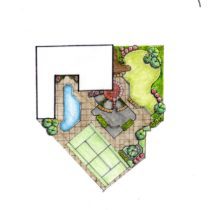Landscape Architecture for Landscape Architects › Forums › EDUCATION › MLA Applicant for Fall 2011
- This topic has 1 reply, 6 voices, and was last updated 15 years, 2 months ago by
Tanya Olson.
-
AuthorPosts
-
December 3, 2010 at 5:26 am #166547
 Jeff YeoParticipant
Jeff YeoParticipantHi everyone,
I am Jeff and like Cody in a previous thread, I just got on this site and am applying to MLA programs for next fall. However, I have a B.S. in biology and I will be applying to first professional programs. I have some questions I am seeking advice and/or opinions for.
My interests lie mainly in habitat restoration, reclamation, brownfield remediation, natural resource management etc. I am also interested in water conservation and transportation. I have narrowed down my choices to Michigan, Kansas State, Colorado-Denver, SUNY-ESF and Virginia because these programs seem to fit my interests the best. Am I missing out on any other relevant programs? Is finding a program that fit my career and academic interests most important? Or should I consider rankings more?
Michigan is my top choice as my alma mater (I bleed maize and blue, now and forever), but it is also the most expensive, and I’m unsure about my chances of obtaining an assistantship or fellowship (is working and pursuing a full-time MLA at the same time realistic?). Kansas State is a very good program but I am concerned about living in a small town in the middle of nowhere for 3 years, and its effect on my psyche and my ability to form professional networks for my career. Colorado-Denver is more affordable, and I really like Denver, but I am wondering why it does not seem to be as highly regarded as the other programs, or if that matters one bit.
I have had extensive experience with film and video, and attempted a Master’s in journalism for a year before realizing that wasn’t my calling and walking away. While I think I am creative, I don’t have much experience in the type of design landscape architects do, and my drawing ability is mediocre. What can I do to make my application more appealing? I think this is my biggest obstacle to doing well in this field. How can I develop confidence in my design abilities?
I am already thinking about a thesis for the MLA. While it seems early, one thing I learned from my short stint in a Master’s program is I can get more out of a program with a focus. I can direct my learning and energy toward producing something I will be most proud of and know extremely well, brightening my career prospects too. How do students come up with or select projects? What should I be looking out for as I progress in the program?
Thank you for enduring and answering my various questions. I look forward to reading your replies.
December 3, 2010 at 3:23 pm #166555Tanya Olson
ParticipantHere’s what I know only from personal experience from dept heads / profs. They carry a lot of their interests with them and suddenly their program is the best in the country for whatever a particular prof is interested in.
Michigan, if its Ann Arbor, sounds like its best suited to what you want to do – Joan Nassauer is there still I think and has extensive interest / research / projects in brownfields, landscape ecology, reclamation, restoration. I worked with and studied under her at the University of MN before she moved to Ann Arbor….speaking of which the U of MN might also be a good place to look at – really good ecology and restoration and water resource management, not as much brownfields that I know of and leaning more heavily toward transportation is my impression. BUT it also has a Master of Science in Landscape Architecture, which would be more science-based and less drawing based. If Dr. Susan Galatowitsch is still there it would be a great program. She’s absolutely brilliant.
UVA is also a good restoration school – Julie Bargmann is there and has a background in fine arts, so you would probably get a lot of appreciation of your film experience there. And she has been working on some really interesting brownfield / reclamation projects for a number of years. If you are at liberty to choose, IMO, choose the program that best suits your interests – both on the biological side and the creative side. If many of the facets of your personality get a workout, you will be happier with your program.I don’t know what criteria is used for admission – when I was in school we had about half non-trad students with a wide range of experience – theology, psychology, business, etc. I am certain its not all based on drawing abilities. The non-trads often worked and had families and went through the program at a slower pace as a result. Some took an extra year to get through, some never finished. They definitely missed out on the studio experience which I found to be one of the best parts of school, but they may not have regretted it. I don’t know. I was also a non-trad, but I took out loans to liveand for tuition and took research assistantships in the department. At the time you got paid and half-tuition credit, which was a great deal, but that was also waaay back when when living expenses were more than tuition so its not like I spent $100,000 on school.
Finally, for your thesis project…you might be surprised at the interesting things that come to your attention during your tenure at school. Being too myopic might cause you to miss something spectacular….
December 3, 2010 at 6:27 pm #166554 earthworkerParticipant
earthworkerParticipantJeff, have you been reading any of the posts on this site? I would seriously reconsider this profession if I were you. Even by the time you graduate, this profession will still be licking its wounds in recovery. Also, the interests you have are typically addressed by environmental engineers not LA’s.
December 3, 2010 at 11:16 pm #166553 seekingjannahParticipant
seekingjannahParticipantHey Jeff, do yourself a favor and don’t go into landscape architecture. I just graduated from the U of M LA program six months ago and I’m sure that most of my classmates and I have have not found a decent job in landscape architecture! There are no jobs in this field period! Zero, nothing. The minuscule number of places that are hiring are looking for people with years of experience.
Also, a rigorous three year program is really NOT worth the time and effort. LA’s are under-appreciated, underpaid and most of them end up doing nothing but planting plans that any old gardener could do for a fraction of the cost. Go into something you can make a decent living with, like computer science, engineering, or regular old architecture.
December 4, 2010 at 12:04 am #166552 Tosh KParticipant
Tosh KParticipantDo take a close look at what you want to do and if LAs are in that field. I like what I do, the pay is low and work hours can be long but being paid to do what I want is nice. It’s not a cushy field by any measure, especially the first few years but most of my friends from grad school are enjoying their work.
Talk to the faculty at each about your ideas of a thesis and what your goals are post-school. I went to UVA (’08), they are great and the program is only getting stronger (I was there through the last transition when we added a big component of ecology -hiring Kristina Hill- and integrating digital media). Graduate school, at least from the UVA school of thought, is about learning the essential skills of the practice of landscape architecture, developing one’s own ethics, and developing the ability to critically research both methods & contemporary discourse in the profession; it requires a substantial initiative on the part of the student and a faculty that can help you develop and challenge those ideas. Faculty matching your interest is critical to a fulfilling experience, balance in a faculty can challenge you too.
I would try to defer and get residency at any state school, some private schools have the capacity to offer fellowships to be financially competitive with state schools so don’t rule them out completely – you can also use multiple admissions to negotiate better financial aid packages (I’m sorry I didn’t).
I came to grad school with a sense of my interest (history and experience of place), took electives to develop a better understanding of the range of discourse (phenomenology, theatre, ephemeral landscapes, memory, perception, ecological philosophy, etc), chose to explore specific topics in studio projects (the site, base program, etc can be assigned, but you can add and emphasize a particular part), and spent time in conversations with my peers and faculty. Finding a mentor or two both in the 2nd and 3rd year classes and faculty is definitely key.
It doesn’t hurt to ask about post-graduate job placement (percentage, where, type of work). Our network was very strong and has helped greatly in job placement, though it is hard many of us landed jobs.
Applying for school from outside the arts is perplexing, but the key is to show creative potential and interest in the subject matter – taking an art class at a local community college or community program (drawing, photography, painting, collage, sculpture) could help you gather materials – most schools have portfolio samples from previous years to show, so ask to see them on visits. I can tell you many of my classmates came from literature and science backgrounds with little fine art experience, so that’s not an issue. I also sure has heck couldn’t draw and was still able to learn along the way.
Rankings don’t mean anything.
UMN is definitely a nice program, I’ve had the chance to chat with a few while narrowing my thesis site (ended up choosing St Louis over Minneapolis). Speaking of, WashU has a new program that might be worth checking out (it’s my undergrad and the university has a knack for building strong programs quickly).
I worked while in school (10~15 hrs a week in a planning/civil engineering office basically 2 half days a week). It wasn’t the easiest thing (work hours cut out of sleep time), but I liked having a little extra income to travel. The federal loan repayment plan currently includes an income based plan which greatly helps in the few years post-graduation (it ranges from 0~15% of your income).
Rather than the location of a program, the distribution of it’s alumni can drive your networking – you can always network via e-mail and at conferences through the faculty.
Good luck and feel free to shoot me a message if you want to know more about UVA.
-T
December 7, 2010 at 6:01 pm #166551 MandyParticipant
MandyParticipantDon’t drink the kool-aid!
December 8, 2010 at 3:17 am #166550 Jeff YeoParticipant
Jeff YeoParticipantHi Mandy,
Thanks for replying. Which argument are you referring to exactly?
December 8, 2010 at 11:19 am #166549 MandyParticipant
MandyParticipantJeff,
How committed are you to this MLA thing? Have you thought about environmental engineering?
December 8, 2010 at 9:51 pm #166548Tanya Olson
ParticipantIf you can believe it, environmental engineers have it even worse than we do….my friend graduated in the spring from one of the best env eng programs in the country and though she did get a job, its an awful civilian Dept. of Defense job located in the worst part of one of the worst states, not gettting any credit toward her PE’s (the engineering eqivalent of the LARE), shuffling paperwork and maybe occasionally doing something interesting like testing the PCB quantities in electrical transformer oil. blech. And it was THE ONLY job available, oh unless whe would rather write EIS’s for surface gold mines in the middle of Nevada.
I think you have better chances with LA. Besides, drinking the kool-aid is so much fun! -
AuthorPosts
- You must be logged in to reply to this topic.


